FLYING TACKLE
Up in the air — drone fishing spins a tangled nest of legal, ethical and conservation dilemmas
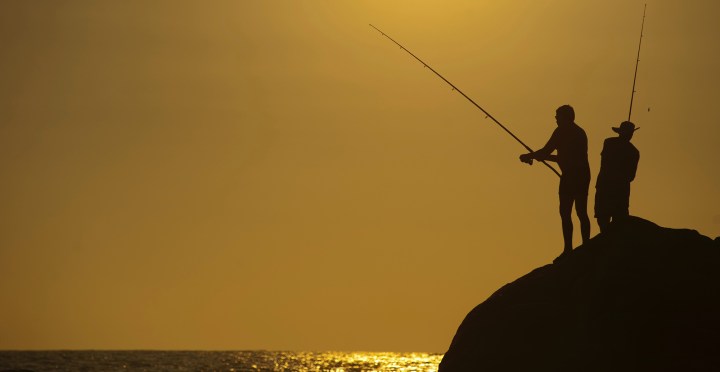
Drone fishing began to gain popularity in South Africa and other nations somewhere around 2015. Eight years later, controversy still swirls around the ethical, legal and marine conservation dimensions of this relatively new, hi-tech method of recreational angling.
In very simple terms, drone-assisted fishing provides anglers with a considerable advantage over “normal” fishers — allowing them to place their hooks and bait much further from the shoreline than fishers who cast their lines manually.
Top-class anglers can manually cast lines up to 160m, though most shore fishermen can only manage around 100m. Drone anglers, however, can deposit hooks up to 500m offshore with pinpoint accuracy.
Not only do drones take much of the heavy lifting and equal opportunity out of shore angling, but several drone devices have camera feeds that allow the operators to “see” and target fish that ordinary shore folk can only guess at.
Several SA fish scientists are worried about the implications of this new craze on heavily exploited or vulnerable species, while many shore-based anglers also question the ethics of new techniques that provide richer anglers with what they see as an unfair advantage.
No wonder then that the emergence of drone-based fishing has stirred controversy — including a high court application and Supreme Court of Appeal case challenging the national Department of Forestry, Fisheries and Environment (DFFE).
Legal bid
Somewhat belatedly, the department issued a notice in February 2022 warning that it would prosecute any recreational anglers who used drones, remote-controlled boats and other forms of remotely operated vehicles to transport bait.
It sent a clear message that this form of fishing was considered illegal and warned that drone fishers faced confiscation of their expensive fishing toys. (Some fishing drones are marketed in SA at more than R60,000 before extras — though cheaper alternatives are also available).
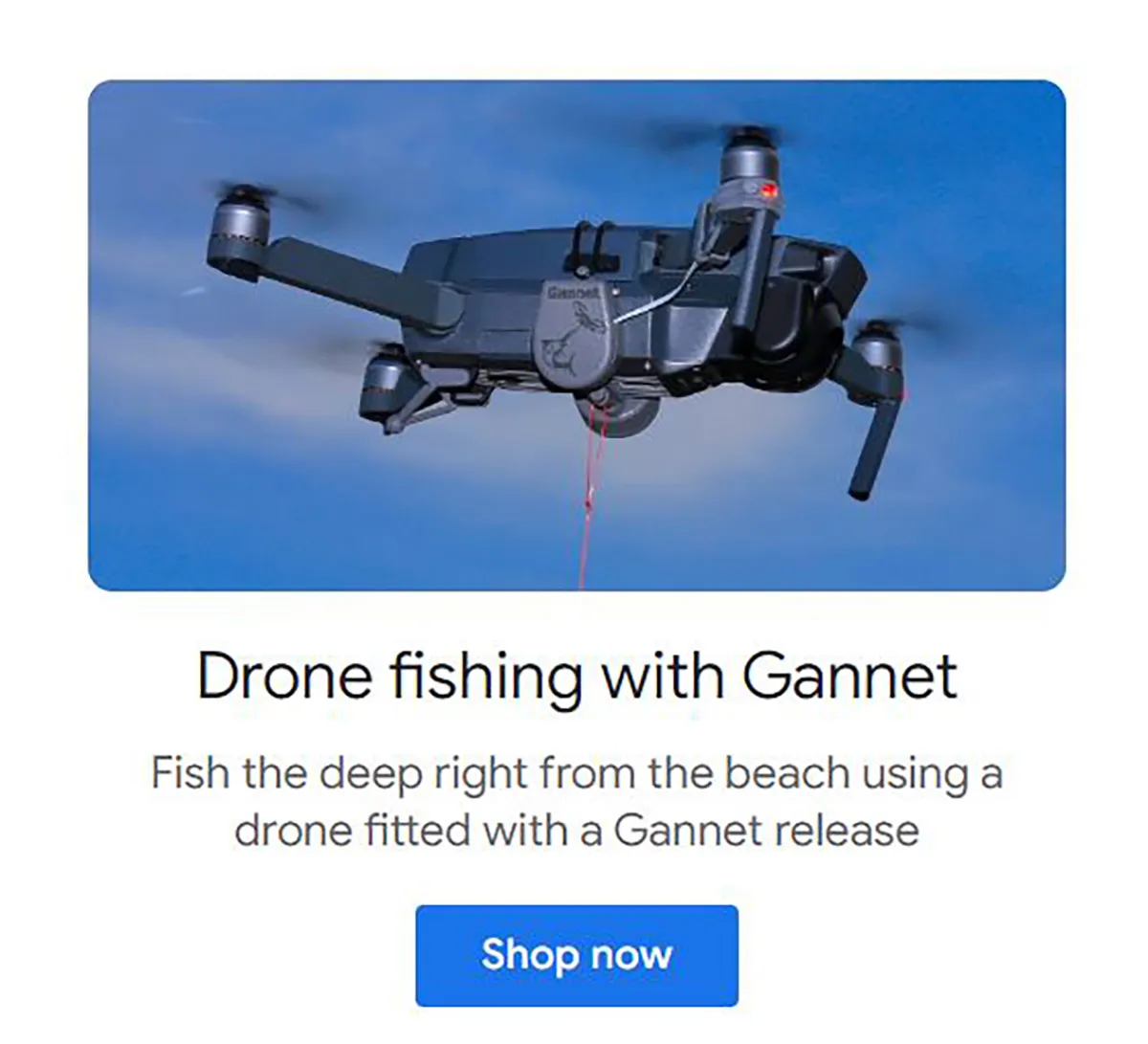
A Gannet fish drone advertisement. (Image: Screenshot)
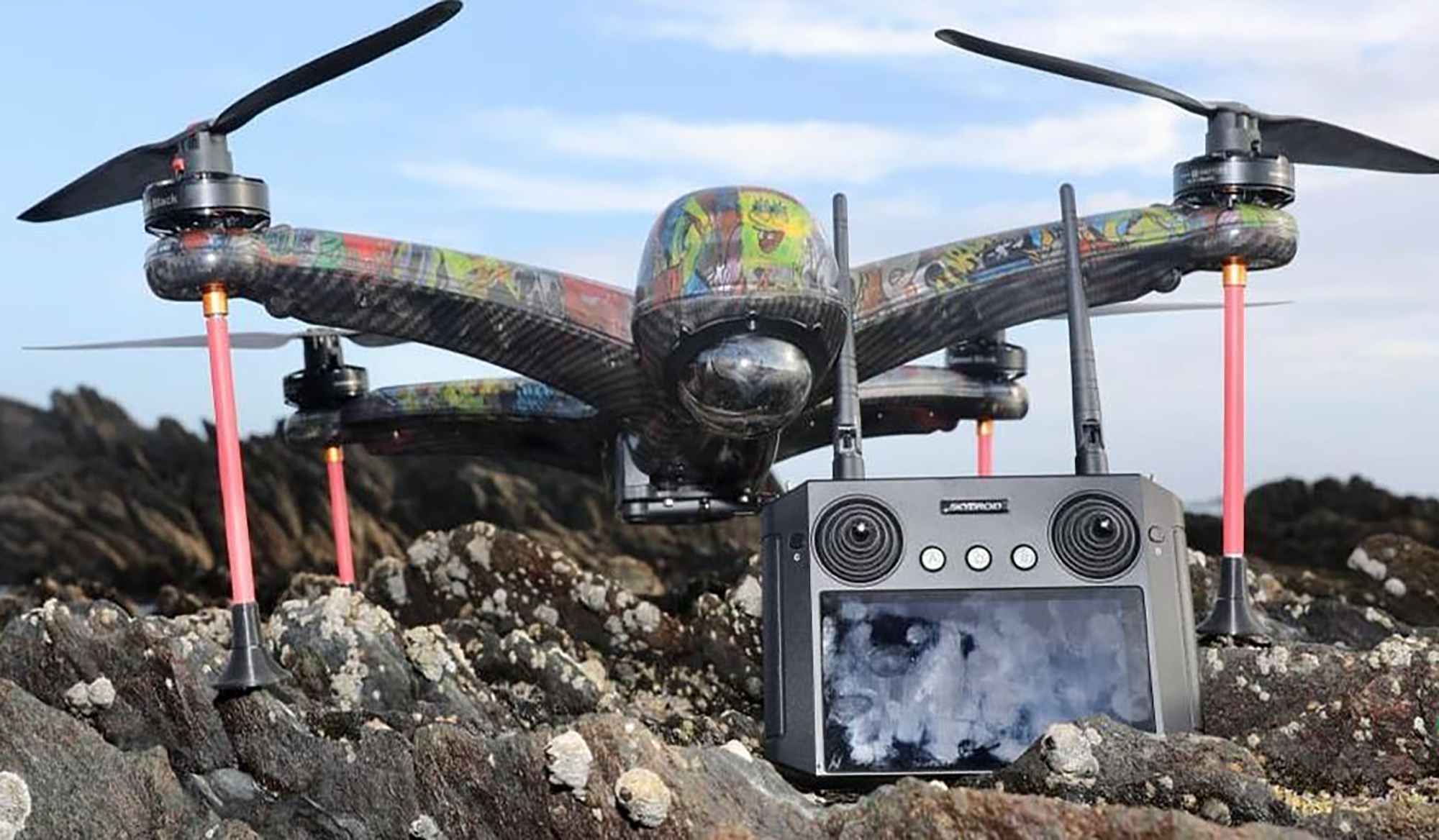
A Gannet Black drone, one of the top-end devices sold locally for drone-fishing. This device is advertised at just over R62 000, before extras. (Photo: dronefishing.com)
According to the DFFE, at least three criminal cases have been opened against drone anglers and these cases are “ongoing”.
However, worried that a significant slice of their income is at stake, five local companies involved in the design, manufacture or sale of drone fishing equipment lodged an application on the urgent roll of the High Court in Pretoria in March 2022.
The five companies — Gannet Works (Pty) Ltd, IARC CC, Unmanned SA (Pty) Ltd, CDS Angling Supplies CC and CEG Projects (Pty) Ltd — urged Judge Tshifhiwa Maumela to grant an order declaring that the use of bait-carrying drones, bait-carrying remote-controlled boats and other remotely operated devices are not prohibited in terms of the Marine Living Resources Act, 18 of 1998.
They further urged Judge Maumela to direct the DFFE to publicly withdraw its warning notice. The drone companies complained that they almost immediately experienced a decline in the sales of drone fishing equipment when the DFFE warning notice was published. Now they were suffering “irreparable prejudice”.
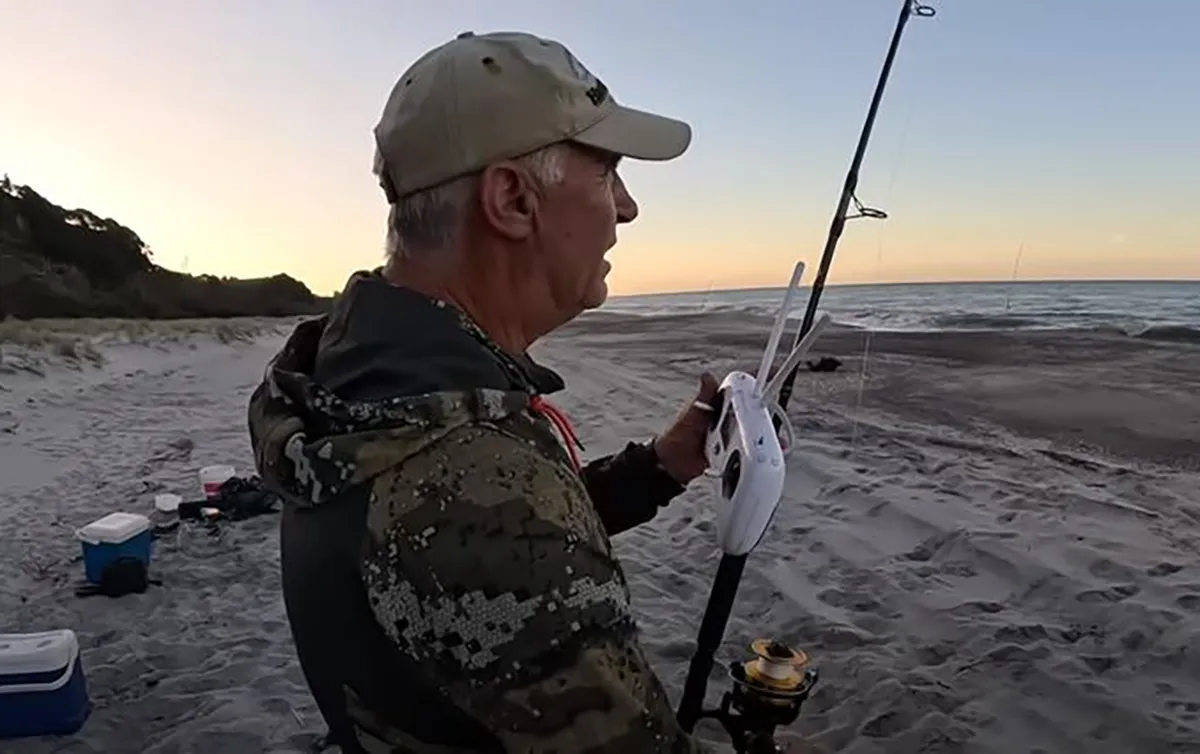
A screengrab of a drone fisher in New Zealand setting up his gear. (Screengrab: YouTube)
People who would otherwise have bought these devices were no longer prepared to buy drones and similar bait-carrying devices because of the fear of falling on the wrong side of the law or having their new equipment confiscated.
Sales had come to a standstill and clients had even cancelled existing orders and demanded their money back, Judge Maumela was told. Further, the companies argued that the DFFE’s public notice was not supported by the provisions of the act or the regulations.
From a legal perspective, they submitted that the act listed several prohibitions and stated that no person could “engage in a fishing or related activity by a method or in a manner prohibited by the minister by notice in the Gazette” — but none of these provisions referred specifically to bait-carrying drones or bait-carrying remote controlled boats.
Finally, they argued, all recreational anglers were required to hold valid permits, while regulations were structured to protect certain species on the basis of mass and size — and that when the act came into being in 2005, drones were still a foreign concept and regulations had not been amended to deal with drones thereafter.
In short, the department was trying to side-step a burdensome public participation process by seeking to intimidate the public into believing that drone fishing was a criminal offence.
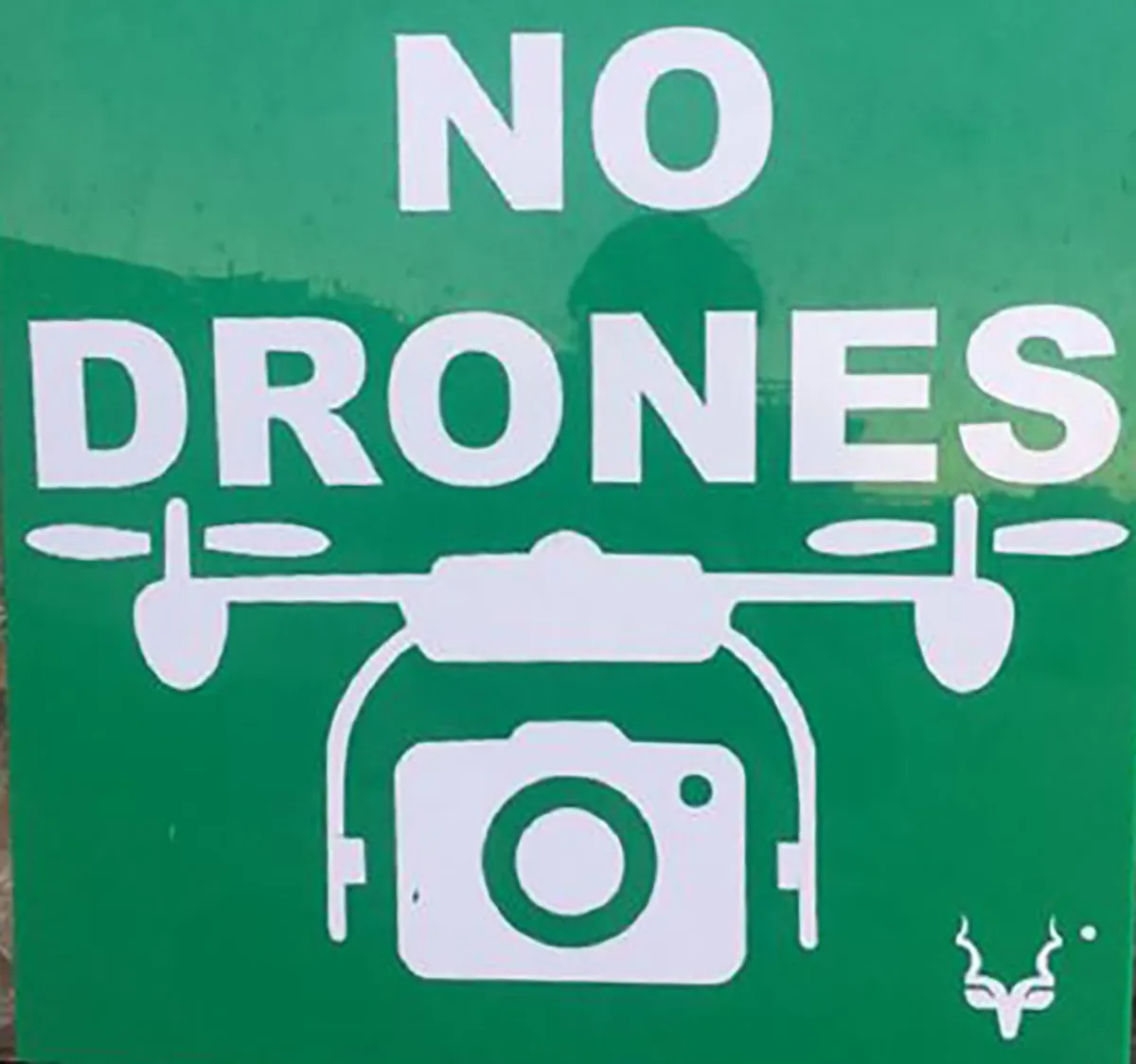
SA National Parks have erected ‘No Drones’ warning signs in some national parks, but a legal dispute continues on whether this new form of fishing is permissible. (Photo: Winkler et al. 2021)
The department, however, submitted that the legal question to be answered was not whether such equipment was prohibited specifically, but whether it was authorised by the relevant fishing permits that only allow “recreational fishing by manually operating a rod, reel and line or one or more separate lines to which no more than 10 hooks are attached per line”.
This implicitly excluded the use of remote-controlled or motorised equipment such as drones.
Further, the DFFE said its notice had merely provided clarity to recreational anglers prior to criminal enforcement action being taken.
Also, the department said, Minister Barbara Creecy had a constitutional duty to ensure that seafish populations remained as stable as possible while enabling fishing to continue for the benefit of all South Africans (present and future generations).
Application dismissed
“If one moves from such a premise, then it cannot be that where one finds gaps within the framework of the operative legislation, then it becomes permissible to engage in acts that undermine the preservation of the environment,” Judge Maumela wrote in his judgment, which dismissed the drone companies’ application with costs.
The department had also provided expert scientific evidence on why only the manual operation of a rod, reel and line was permitted.
“Such evidence is indicative… that apart from being unlawful, the method of using motorised equipment to fish has potential to bring about an adverse impact upon certain species of fish.
“This is within a context where the populations of these species, and their ability to recover, is already proving to be in a dire state. This adverse impact in turn impacts negatively upon the livelihoods of small-scale fishers, thereby impacting negatively upon their chances of survival,” the judge stated.
But the five drone companies have not thrown in the towel.
Their application for leave to appeal was dismissed in October, but on May 2, 2023, the Supreme Court of Appeal granted leave to appeal. This appeal is pending and has not yet been heard.
The DFFE, for its part, issued a further statement on 1 June underlining its determination to keep prosecuting drone fishers.
It noted that various social media sites recently began providing “incorrect information to the public.
“The incorrect messaging was to the effect that leave to appeal being granted had invalidated the notification of 24 February 2022 and that fishing with drones was now lawful. Anglers were encouraged to continue to use their drones to drop bait. This is, however, an incorrect interpretation of the law.
“Indeed, the DFFE has obtained senior counsel opinion which clearly states that the application for leave to appeal having been granted does not in any way invalidate the 24 February 2022 notification, which notification was a summary and explanation of the legal provisions in the MLRA as they relate to recreational angling. Drone fishing remains prohibited despite leave to appeal having been granted.”
Unknown impact
Quite apart from these legal arguments on drone fishing, questions abound over the impacts on fish and the marine environment and the ethical dimensions for recreational anglers.
While drone fishers may point to the fact that skiboaters and commercial anglers often use very sophisticated technology to target or catch fish, more traditional shore fishers and subsistence anglers will be watching developments closely.
In a research article published in the Royal Swedish Academy of Sciences’ journal Ambio in 2021, SA fish scientists Alexander Winkler, Edward Butler, Colin Attwood, Bruce Mann and Warren Potts note that there are few, if any, monitoring programmes on the impacts of drone fishing in most parts of the world.
“Within the South African context, the evolution of drone fishing is highly contentious given that the inshore recreational fishery is the largest marine fishery by number of participants, largely open access, poorly governed and in direct competition with subsistence, artisanal and small-scale commercial fishers.
“Given the increased use of drones for fisheries reconnaissance and the rapid advances in these types of technologies, we may not be far from a time where drones could be used to continually monitor and broadcast live information on fish distribution and fishing conditions to recreational anglers through the internet,” they warned.
Why is drone fishing a worry for marine fish researchers?
Mann, a keen fisherman, senior fish scientist and research associate at the Oceanographic Research Institute (ORI), has summarised some of the concerns of SA marine fish researchers about the growth of the drone-fishing industry.
Mann and his colleagues at the ORI and the SA Association for Marine Biological Research (SAAMBR) say they are “disappointed” that it took so long for the national Department of Environmental Affairs to react to the growth of drone fishing from 2015 onwards. However, they have expressed strong support for the government’s belated action to prohibit this new type of fishing.

Screenshot of a ‘No Drones’ sign and a mutilated bronze whaler shark savaged by other predator fish while being landed by a drone fisher. (Image: doi.org/10.1007/s13280-021-01578-y)
“SAAMBR/ORI is of the opinion that the overall management of marine recreational fishing in South Africa is extremely poor and much needs to be done to improve the monitoring of effort and catches, adjusting of regulations, and assessing the efficacy of compliance strategies.
“Our reasons for supporting the regulations are summarised below:
- Drones have made shore angling a far more effective means of catching large fish. The Marine Living Resource Act (MLRA) limits angling to manual methods, and it is necessary to limit the gear technology that anglers use, especially as there is no possibility of limiting the number of anglers.
- Drones enable anglers to target species and access habitats beyond casting distance from the shore. This has resulted in increased catches of endangered shark and ray species and fish species such as black musselcracker in the Eastern Cape and silver kob and white steenbras in the Western Cape.
- Drones are being used to fish illegally in offshore no-take areas which were specifically zoned to protect offshore reef fish (eg, within the Pondoland Marine Protected Area).
- Fish and shark species are being hooked long distances offshore (hundreds of metres) resulting in extended fight times, reduced survival rates after release and greater levels of depredation by other predators.
- The long distances of line or braid in the water after the bait is dropped by a drone result in greater amounts of lost tackle (and subsequent environmental impacts) when break-offs do occur.
- The high cost of drones makes this type of fishing only available to a few affluent anglers. This is considered an unfair advantage by most shore anglers who are limited to traditional casting. A degree of user conflict has thus developed between drone anglers and conventional shore anglers.
- Flying of drones in public spaces such as on beaches can impact on the privacy and enjoyment of the beach by other users.
- Drones are being used to transport baits long distances out to sea (up to 500m) and in so doing are in contravention of the South African Civil Aviation Authority (SACAA) regulations which prohibit recreational drones carrying and dropping a payload. They also present a considerable danger to manned aircraft flying at low altitude along the coast, especially light sport aircraft.
- Some drone anglers (especially along the KZN coast) operate their drones within a 10km radius of an aerodrome or in prohibited, restricted or controlled airspace. This is extremely dangerous and is also prohibited by the SACAA.
- Some drone pilots are charging a fee to carry other anglers’ baits long distances out to sea. In most cases this is illegal as these pilots do not have the necessary permission (or training) to do this (ie, a commercial UAV pilot’s licence)”. DM





















There can be little doubt, irrespective of how the details are argued in and outside court, that drone fishing will add to the extreme pressure already being felt by at least 60 percent of global fisheries with grave consequences for, food security, economies, fishers, fish and other species. There is a global “30×30” target to protect 30% of the planet (land and sea) for nature by 2030 via the Global Biodiversity Framework. Let’s hope that the plan will include the banning of destructive practices such as drone-fishing and bottom-trawling.
all property below high water mark is public, so doubtful drones are allowed in any event.
The ethics is probably similar to the very advanced fish finders on boats. More money & better tech gives some fishermen an advantage